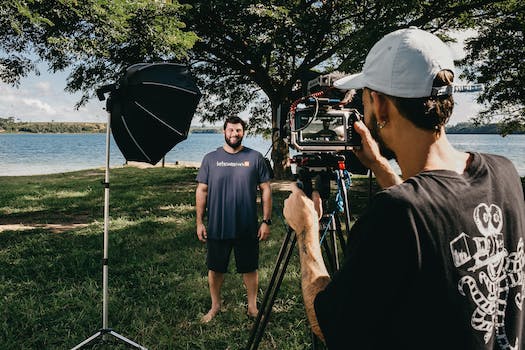
Hollywood's Most Iconic Movie Directors and Their Best Works
-
Table of Contents
- Introduction
- A Look at Steven Spielberg’s Most Iconic Movies and Their Impact on Pop Culture
- Martin Scorsese: A Retrospective of His Most Influential Films
- Quentin Tarantino: Exploring His Unique Style and Signature Dialogue
- Alfred Hitchcock: Examining His Masterful Use of Suspense and Thrills
- Stanley Kubrick: An Analysis of His Groundbreaking Visuals and Cinematic Techniques
- Q&A
- Conclusion
“Experience the Magic of Hollywood’s Most Iconic Directors and Their Greatest Films!”
Introduction
Hollywood has produced some of the most iconic movie directors of all time. From Alfred Hitchcock to Steven Spielberg, these directors have created some of the most memorable films in cinematic history. Their works have been praised for their technical brilliance, captivating storytelling, and powerful performances. In this article, we will explore some of Hollywood’s most iconic movie directors and their best works. We will look at the directors’ backgrounds, their most acclaimed films, and the lasting impact they have had on the film industry.
A Look at Steven Spielberg’s Most Iconic Movies and Their Impact on Pop Culture
Steven Spielberg is one of the most iconic filmmakers of all time. His movies have had a profound impact on pop culture, and his influence can be seen in films, television, and other media. From his early work in the 1970s to his more recent films, Spielberg has created some of the most beloved and iconic movies of all time.
One of Spielberg’s earliest and most iconic films is Jaws (1975). This classic thriller about a great white shark terrorizing a small beach town was a massive success, becoming the highest-grossing film of all time at the time of its release. It also spawned a series of sequels and a popular theme park ride. Jaws is credited with popularizing the summer blockbuster and inspiring a generation of filmmakers.
Another classic Spielberg film is E.T. the Extra-Terrestrial (1982). This heartwarming story of a young boy and his alien friend captivated audiences around the world. The film was a massive success, becoming the highest-grossing film of all time until it was surpassed by Jurassic Park (1993). E.T. is credited with popularizing the idea of a “family film” and inspiring a generation of filmmakers.
Spielberg’s most iconic film is arguably Jurassic Park (1993). This thrilling adventure about a theme park filled with living dinosaurs was a massive success, becoming the highest-grossing film of all time until it was surpassed by Titanic (1997). Jurassic Park spawned a series of sequels and a popular theme park ride. The film is credited with popularizing the idea of a “monster movie” and inspiring a generation of filmmakers.
Spielberg’s most recent iconic film is Saving Private Ryan (1998). This powerful war drama about a group of soldiers sent to rescue a soldier behind enemy lines was a massive success, becoming the highest-grossing war film of all time. The film is credited with popularizing the idea of a “war movie” and inspiring a generation of filmmakers.
Steven Spielberg’s films have had a profound impact on pop culture. His movies have become iconic, inspiring a generation of filmmakers and captivating audiences around the world. From Jaws to Saving Private Ryan, Spielberg’s films have become part of the fabric of pop culture, and his influence can be seen in films, television, and other media.
Martin Scorsese: A Retrospective of His Most Influential Films
Martin Scorsese is one of the most influential filmmakers of all time. His films have been praised for their technical brilliance, their powerful performances, and their unique visual style. From his early works to his more recent films, Scorsese has consistently pushed the boundaries of cinema and created some of the most iconic films of all time. In this retrospective, we’ll take a look at some of his most influential films and explore why they have had such a lasting impact.
Taxi Driver (1976)
Taxi Driver is one of Scorsese’s most iconic films. It tells the story of Travis Bickle, a disturbed Vietnam veteran who takes a job as a taxi driver in New York City. The film is a powerful exploration of loneliness, alienation, and violence, and it features some of Robert De Niro’s most iconic performances. The film was a critical and commercial success, and it has since become a classic of American cinema.
Raging Bull (1980)
Raging Bull is another classic from Scorsese. It tells the story of Jake LaMotta, a middleweight boxer whose career and personal life are in decline. The film is a powerful exploration of masculinity, violence, and the human condition. It features some of Robert De Niro’s best performances, and it is widely considered to be one of the greatest films of all time.
Goodfellas (1990)
Goodfellas is another classic from Scorsese. It tells the story of Henry Hill, a mobster who rises through the ranks of the criminal underworld. The film is a powerful exploration of loyalty, betrayal, and the criminal lifestyle. It features some of Robert De Niro’s best performances, and it is widely considered to be one of the greatest films of all time.
The Departed (2006)
The Departed is another classic from Scorsese. It tells the story of two men, one a cop and the other a criminal, who are both trying to infiltrate the other’s organization. The film is a powerful exploration of loyalty, betrayal, and the criminal lifestyle. It features some of Leonardo DiCaprio’s best performances, and it is widely considered to be one of the greatest films of all time.
The Wolf of Wall Street (2013)
The Wolf of Wall Street is another classic from Scorsese. It tells the story of Jordan Belfort, a stockbroker who rises to the top of the financial world before his life spirals out of control. The film is a powerful exploration of greed, excess, and the power of money. It features some of Leonardo DiCaprio’s best performances, and it is widely considered to be one of the greatest films of all time.
Martin Scorsese has created some of the most iconic films of all time. From Taxi Driver to The Wolf of Wall Street, his films have consistently pushed the boundaries of cinema and explored some of the most complex themes in modern cinema. His films have had a lasting impact on the world of cinema, and they will continue to be studied and admired for years to come.
Quentin Tarantino: Exploring His Unique Style and Signature Dialogue

Quentin Tarantino is one of the most iconic filmmakers of our time. His unique style and signature dialogue have made him a household name, and his films have become some of the most beloved and influential of all time.
Tarantino’s writing style is characterized by its non-linear structure, dark humor, and clever dialogue. He often uses flashbacks and non-chronological storytelling to create suspense and surprise. His dialogue is often witty and fast-paced, and he often uses pop culture references to add depth and humor to his stories.
Tarantino’s films often feature strong female characters, and he often uses violence as a way to explore themes of justice and revenge. His films often feature a mix of genres, such as crime, western, and martial arts. He often uses music to create a unique atmosphere and to set the tone of his films.
Tarantino’s films have been praised for their originality and for their ability to blend different genres. His films often feature strong performances from his actors, and his dialogue is often quoted by fans. His films have been nominated for numerous awards, including Academy Awards, Golden Globes, and BAFTAs.
Tarantino’s unique style and signature dialogue have made him one of the most influential filmmakers of our time. His films have become some of the most beloved and influential of all time, and his writing style has been praised for its originality and for its ability to blend different genres. His films often feature strong female characters, and his dialogue is often quoted by fans. His films have been nominated for numerous awards, and his unique style and signature dialogue have made him a household name.
Alfred Hitchcock: Examining His Masterful Use of Suspense and Thrills
Alfred Hitchcock is widely regarded as one of the greatest filmmakers of all time. His mastery of suspense and thrill has captivated audiences for decades, and his influence can still be seen in modern films. In this article, we will examine Hitchcock’s use of suspense and thrills, and how he crafted some of the most iconic scenes in cinematic history.
Hitchcock was a master of suspense, and he used a variety of techniques to create tension and keep viewers on the edge of their seats. He often employed the use of long takes, allowing the audience to experience the tension and fear of the characters. He also used sound to great effect, creating a sense of dread and anticipation. Hitchcock also used camera angles to create a sense of unease, often shooting from low angles to make the characters appear vulnerable and powerless.
Hitchcock was also a master of the thriller genre, and he used a variety of techniques to create thrilling moments. He often used quick cuts and montages to create a sense of urgency and excitement. He also used music to great effect, creating a sense of tension and anticipation. Hitchcock also used camera angles to create a sense of danger and excitement, often shooting from high angles to make the characters appear small and powerless.
Hitchcock’s use of suspense and thrills has been an inspiration to filmmakers for decades. His films are still studied and analyzed by film scholars, and his influence can still be seen in modern films. Hitchcock’s mastery of suspense and thrill has made him one of the most influential filmmakers of all time, and his legacy will continue to inspire filmmakers for years to come.
Stanley Kubrick: An Analysis of His Groundbreaking Visuals and Cinematic Techniques
Stanley Kubrick is widely regarded as one of the most influential and groundbreaking filmmakers of all time. His films are renowned for their stunning visuals, complex narratives, and innovative cinematic techniques. In this article, we will take a closer look at Kubrick’s unique style and examine how he revolutionized the art of filmmaking.
Kubrick’s films are characterized by their meticulous attention to detail. He was known for spending months researching and planning his projects before shooting a single frame. He was also a master of composition, often using wide-angle lenses to create a sense of grandeur and scale. Kubrick was also a pioneer in the use of special effects, employing techniques such as rear projection and miniatures to create stunning visuals.
Kubrick was also a master of editing. He often used long takes and slow zooms to create tension and suspense. He was also a master of sound design, often using diegetic sound to create a sense of realism. Kubrick was also a master of lighting, often using natural light to create a sense of atmosphere.
Kubrick was also a master of storytelling. He often used non-linear narratives and unconventional structure to create a sense of mystery and suspense. He was also a master of symbolism, often using objects and images to convey deeper meaning.
Kubrick’s films are renowned for their psychological depth and complexity. He often used themes of morality, power, and identity to explore the human condition. His films are also known for their dark humor and satire, often using irony and black comedy to explore the darker side of human nature.
Kubrick’s influence on the art of filmmaking is undeniable. His groundbreaking visuals, innovative techniques, and psychological depth have inspired generations of filmmakers. His films are timeless classics that will continue to be studied and admired for years to come.
Q&A
1. Who is Alfred Hitchcock and what is his most iconic work?
Alfred Hitchcock was an English film director and producer who is widely regarded as one of the most influential filmmakers in the history of cinema. His most iconic work is the 1960 psychological thriller, Psycho.
2. Who is Stanley Kubrick and what is his most iconic work?
Stanley Kubrick was an American film director, producer, and screenwriter who is widely regarded as one of the greatest and most influential filmmakers of all time. His most iconic work is the 1968 science fiction film, 2001: A Space Odyssey.
3. Who is Steven Spielberg and what is his most iconic work?
Steven Spielberg is an American filmmaker who is one of the most commercially successful directors in history. His most iconic work is the 1975 science fiction film, Jaws.
4. Who is Martin Scorsese and what is his most iconic work?
Martin Scorsese is an American filmmaker and historian who is widely regarded as one of the most significant and influential filmmakers in cinematic history. His most iconic work is the 1990 crime drama, Goodfellas.
5. Who is Quentin Tarantino and what is his most iconic work?
Quentin Tarantino is an American filmmaker and actor who is widely regarded as one of the most influential filmmakers of his generation. His most iconic work is the 1994 crime film, Pulp Fiction.
Conclusion
Hollywood’s most iconic movie directors have created some of the most memorable and beloved films of all time. From Alfred Hitchcock’s suspenseful thrillers to Steven Spielberg’s heartwarming family films, these directors have left an indelible mark on the film industry. Their works have inspired generations of filmmakers and continue to be celebrated by audiences around the world. The legacy of these directors will live on for many years to come.






